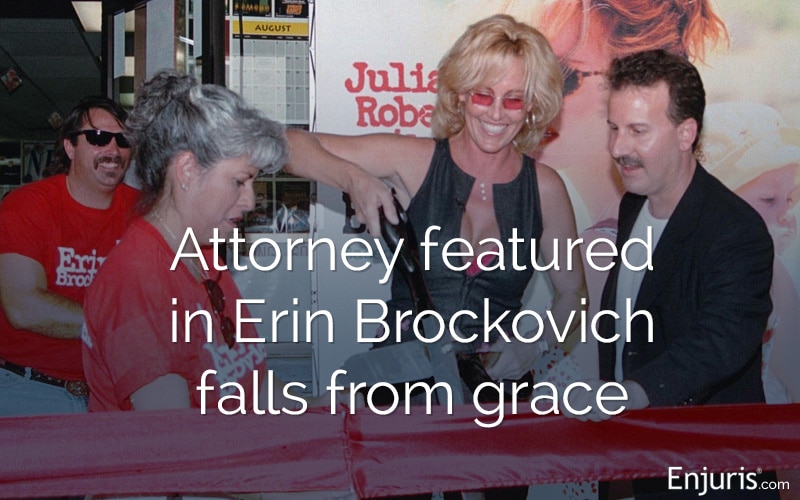[ad_1]

California personal injury attorney Tom Girardi—who was portrayed in the 2000 film Erin Brockovich—has been disbarred and ordered to pay more than $2 million in restitution to his clients.
Let’s take a look at Tom Girardi’s fall from grace, and what steps you should take if you think your attorney is taking advantage of you.
Who is Tom Girardi?
Tom Girardi was admitted to practice law in California on January 13, 1965.
He co-founded the now-defunct Girardi & Keese law firm in Los Angeles. The firm, which was known for representing individuals in lawsuits against large corporations, gained national attention when it was portrayed in the movie Erin Brockovich, starring Julia Roberts.
In the case portrayed in the film, residents of Hinkley, California, filed a lawsuit against Pacific Gas & Electric, alleging that the company was responsible for contaminating their drinking water with a cancer-causing chemical.
The utility company agreed to pay $460 million to 650 residents, most of whom had developed some form of cancer as a result of drinking the water.
Tom had a number of other legal successes in his career. He was the first lawyer in California to obtain a $1 million award for a medical malpractice case and he successfully handled cases against a number of large corporations, including the Lockheed Martin Corporation and the Los Angeles County Metropolitan Transportation Authority.
Tom was also known for his marriage to Erika Girardi, who appeared on The Real Housewives of Beverly Hills.
Why was Tom Girardi disbarred by the California Supreme Court?
California is the only state in the country that has an independent court dedicated to ruling on attorney discipline cases.
The State Bar Court hears charges filed by the California State Bar’s Office of Chief Trial Counsel (OCTC) against attorneys who may have broken a law or ethical rule. The State Bar Court has the authority to recommend that the California Supreme Court disbar an attorney.
On March 30, 2021, the OCTC charged Tom Girardi with 14 counts of violating various ethical rules and breaking various California laws.
All of the charges stemmed from three cases in which Tom Girardi allegedly stole money from his clients. The bulk of the stolen money was designated for the children of victims killed in the 2018 crash of Indonesia’s Lion Air Flight 610.
Tom’s methods of stealing from his clients varied. Here is one example:
Upon receiving a settlement, Tom stated in the settlement disbursement sheet that his law firm was entitled to 40 percent of the recovery even though he had signed a fee agreement with the client agreeing to take only 33 percent.
Tom did not file a response to the charges and a default judgment was entered. Essentially, this meant that all of the allegations made by the OCTC were deemed admitted.
The OCTC ordered Tom to pay more than $2 million (plus 10% interest and $5,000 in sanctions). The OCTC also ordered Tom to be disbarred.
On June 1, 2022, the California Supreme Court approved the OCTC’s order.
Tom declared bankruptcy and told the Court that he no longer had the money he owed his clients. Tom has since been diagnosed with Alzheimer’s disease.
“Thomas Girardi has done significant and profound harm to many and while his disbarment does not minimize those impacts, it is an acknowledgment of the people he victimized,” Bar Chief Trial Counsel George Cardona said.”
How do lawyers bill for their services?
The most common type of fee arrangement in a personal injury case is a contingent fee arrangement.
In a contingent fee arrangement, the lawyer accepts an agreed-upon percentage of the amount you recover. If you don’t recover any money, you don’t owe your lawyer anything for the work they performed on your case.
The second most common type of fee arrangement in a personal injury case is an hourly rate arrangement.
In an hourly rate arrangement, your lawyer charges a per-hour rate and tracks their time. A billing statement documenting the work is sent to you at the end of every month to be paid.
In both cases, lawyers are required to keep all of the money that belongs to the client (advanced fee payments, settlement payments, etc.) in a client trust account. Lawyers are prohibited from commingling client funds with personal funds.
Keep an eye out for unethical billing
A good attorney is open and honest about their costs. Be sure to discuss costs with your attorney before you sign an attorney-client agreement and steer clear of any attorneys who are vague about or unwilling to discuss costs.
What’s more, the fee arrangement should be clearly stated in the attorney-client agreement or a separate fee agreement.
If you receive billing statements, be sure to read them closely and ask the attorney any questions you may have.
What should you do if you think your attorney is behaving unethically?
If you believe your attorney is engaging in unethical or illegal billing, start by having a civil conversation with your attorney. Honest mistakes do happen.
If you’re still unable to resolve a billing dispute after a conversation, it’s time to reach out for help. Here are a couple of places to look:
- The California State Bar. The California State Bar helps resolve attorney fee disputes through an informal and low-cost Mandatory Fee Arbitration program.
- Other counsel. It may be necessary to reach out to another attorney to help resolve the fee dispute and recover the money you’re owed.
Most lawyers are good people who work hard and want the best for their clients. But, as is the case in all walks of life, there are a few bad apples out there. If you have questions about a fee dispute, consider reaching out to the attorneys at MVP Accident Attorneys.
[ad_2]




